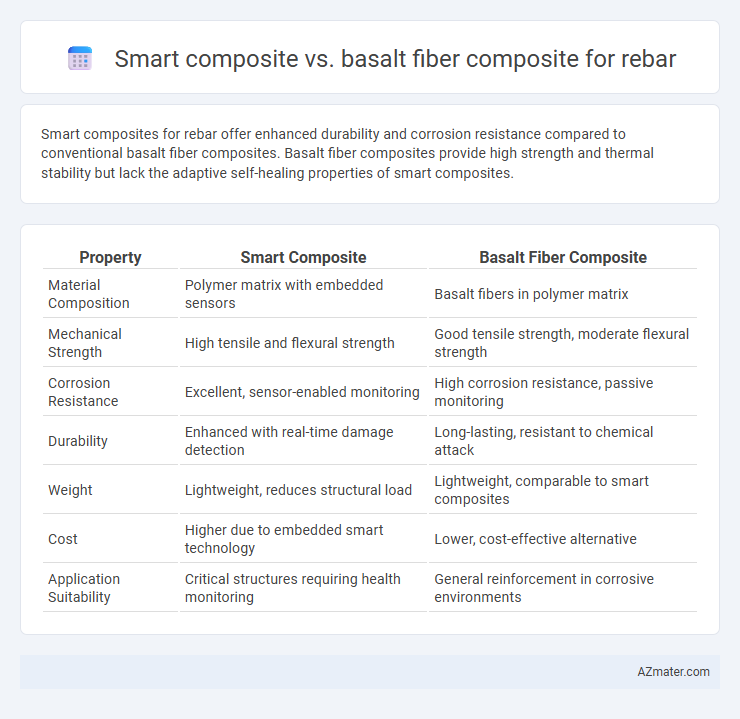Smart composites for rebar offer enhanced durability and corrosion resistance compared to conventional basalt fiber composites. Basalt fiber composites provide high strength and thermal stability but lack the adaptive self-healing properties of smart composites.
Table of Comparison
| Property | Smart Composite | Basalt Fiber Composite |
|---|---|---|
| Material Composition | Polymer matrix with embedded sensors | Basalt fibers in polymer matrix |
| Mechanical Strength | High tensile and flexural strength | Good tensile strength, moderate flexural strength |
| Corrosion Resistance | Excellent, sensor-enabled monitoring | High corrosion resistance, passive monitoring |
| Durability | Enhanced with real-time damage detection | Long-lasting, resistant to chemical attack |
| Weight | Lightweight, reduces structural load | Lightweight, comparable to smart composites |
| Cost | Higher due to embedded smart technology | Lower, cost-effective alternative |
| Application Suitability | Critical structures requiring health monitoring | General reinforcement in corrosive environments |
Introduction to Composite Rebar Materials
Composite rebar materials, such as smart composites and basalt fiber composites, offer enhanced durability and corrosion resistance compared to traditional steel rebar. Smart composite rebar integrates advanced sensing capabilities that monitor structural health in real time, providing proactive maintenance data. Basalt fiber composite rebar, derived from volcanic rock fibers, combines high tensile strength and chemical stability, making it a sustainable and robust alternative for reinforcing concrete structures.
What Are Smart Composite Rebars?
Smart composite rebars incorporate advanced materials like carbon fiber optics or embedded sensors within a fiber-reinforced polymer matrix to enhance real-time structural health monitoring and improve durability compared to traditional composites. Basalt fiber composite rebars, made from naturally derived basalt fibers, offer high corrosion resistance and mechanical strength but lack the integrated sensing capabilities of smart composites. These smart composite rebars provide critical data on stress, strain, and temperature changes, enabling proactive maintenance and extending the lifespan of reinforced concrete structures.
Understanding Basalt Fiber Composite Rebars
Basalt fiber composite rebars offer exceptional corrosion resistance and high tensile strength, making them a durable alternative to traditional steel rebars in construction. Their lightweight nature reduces handling and transportation costs, while maintaining superior thermal stability and chemical inertness compared to smart composites. Understanding basalt fiber composite rebars is crucial for optimizing infrastructure longevity and performance in harsh environmental conditions.
Mechanical Properties Comparison
Smart composites for rebar combine advanced polymer matrices with high-strength fibers, offering superior tensile strength and enhanced impact resistance compared to basalt fiber composites, which excel in corrosion resistance and thermal stability. Basalt fiber reinforcing bars typically provide higher modulus of elasticity and better durability in harsh environmental conditions, while smart composites show improved fatigue performance and adaptability under cyclic loading. Evaluating mechanical properties such as tensile strength, modulus, elongation at break, and fatigue resistance highlights smart composites' potential for dynamic structural applications, whereas basalt composites remain preferable for long-term infrastructure exposed to aggressive chemical environments.
Durability and Corrosion Resistance
Basalt fiber composites offer superior corrosion resistance compared to traditional steel rebar, making them ideal for harsh environments and reducing maintenance costs. Smart composites enhance durability by integrating sensors that monitor structural health in real-time, allowing early detection of damage and preventing long-term degradation. Both materials significantly improve lifespan, but basalt fiber composites excel in chemical stability while smart composites provide proactive durability management.
Cost Analysis and Economic Viability
Smart composites for rebar, integrating advanced fiber technologies, generally exhibit higher initial costs compared to basalt fiber composites due to sophisticated manufacturing processes and enhanced performance features. Basalt fiber composites offer a cost-effective alternative with lower raw material and production expenses while maintaining adequate mechanical properties for rebar applications. Economic viability favors basalt fiber composites in large-scale infrastructure projects where budget constraints prioritize cost-efficiency without significantly compromising durability and strength.
Environmental Impact and Sustainability
Smart composites for rebar, designed with advanced polymer matrices and recycled content, reduce carbon footprints through lower energy consumption in production and enhanced durability, leading to longer service life and diminished resource depletion. Basalt fiber composites offer natural mineral-based reinforcement with exceptional resistance to corrosion, reducing the need for chemical treatments and decreasing environmental hazards compared to traditional steel rebar. Both materials contribute to sustainable construction by minimizing greenhouse gas emissions and promoting circular economy principles, but basalt fiber composites provide a more eco-friendly alternative due to their natural origin and lower embodied energy.
Installation and Handling Considerations
Smart composites for rebar offer significant advantages in installation and handling due to their lightweight nature and enhanced flexibility, reducing labor effort and minimizing damage during transportation and placement. Basalt fiber composites, while heavier than smart composites, provide excellent corrosion resistance and mechanical strength, which may require more careful handling to avoid surface damage but ensure long-term durability. Both materials improve ease of installation compared to traditional steel rebar, with smart composites outperforming in terms of weight reduction and adaptability on-site.
Applications in Construction Projects
Smart composites used in rebar technology enhance structural performance by integrating sensors for real-time monitoring of stress and corrosion, making them highly suitable for critical infrastructure like bridges and tunnels. Basalt fiber composites deliver superior durability, chemical resistance, and thermal stability, ideal for reinforcing concrete in harsh environments such as marine structures and industrial facilities. Construction projects benefit from smart composite rebar when intelligent health monitoring is required, while basalt fiber composite rebar is preferred for long-term durability and environmental resilience.
Future Trends and Innovations in Composite Rebars
Smart composites for rebar integrate sensors and self-healing capabilities, offering real-time monitoring of structural health and enhanced durability, setting new benchmarks in infrastructure safety. Basalt fiber composites provide superior corrosion resistance and eco-friendly characteristics, becoming increasingly favored for sustainable construction applications. Future trends highlight hybrid smart-basalt composites combining sensor technology with environmental resilience to revolutionize rebar performance and lifecycle management.

Infographic: Smart composite vs Basalt fiber composite for Rebar
 azmater.com
azmater.com